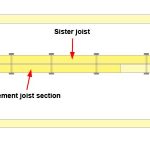Just like any skilled trade, carpentry and joinery is in demand throughout the UK. This will often fluctuate, based on a variety of factors. On a larger scale, this will involve things like the wider economy. As well as the time of year.
Between 2020 and 2022, the demand for tradespeople has risen significantly. This is across carpentry and many other professions; it is mainly due to an increase in home renovations.
Based on data collected by Rated People, the demand for trades has gone up 50% since the beginning of 2020. This was largely impacted by the pandemic, which caused many people to start undertaking work in their homes and gardens.

Things like home offices, loft conversions, extensions, garden decking and flooring are some of the most popular carpentry jobs throughout this period.
Obviously, people were spending more time in the house, and for many this included working from home. As a result, lots of people needed to create working spaces, such as home offices and study areas. Also, things like home gyms, and even home bars, became a priority for some people during this period.
Another popular area for work was improving personal outside space. This space became extremely valuable, due to the restrictions placed on people leaving their homes. Hence, the increased demand for things like external decking, which provided people with nice areas to spend more time outside.
Possible reduce demand for carpenters in the UK
Predicting the level of demand for trades like carpentry and joinery in the future is difficult. The main thing that would reduce demand is economic issues. For example, if the UK has a recession, this will almost definitely reduce demand.
During the last financial crisis between 2007 and 2009, most construction companies slowed down considerably. This meant, as a general rule, most of them were not starting new projects. Instead they would concentrate on existing work, with the aim to protect their existing assets.
In many cases, this would mean operating at break even, or even a small loss. The main goal during this period would not be to grow, but to simply stay afloat. This means workers would have less hours, very little chance for overtime, and often reduced rates of pay. In the worst-case scenario people would have been laid off.
Also, as money becomes tighter for the general public, home renovations reduce, and people are far more likely to delay projects, until the economic uncertainty improves.
In this type of situation, a decrease in demand is inevitable. However, this is temporary, the market as a whole is cyclical. Therefore, demand will reduce and increase as things in the economy change over time.
Time of year demand for carpentry and joinery
Anyone that has worked in carpentry will know, winter is generally a quieter period, with less demand. Construction companies will usually slowdown in the colder months.
This is mainly due to cold and wet weather slowing down the work. Also, shorter days reduce the number of hours working on site, and the weather can affect external factors such as supplies and materials.
Quite often, demand will be significantly lower between late November and February, compared with the rest of the year. Intelligent tradespeople, will take this into account, saving money from earlier in the year, to mitigate less work in winter.
When I worked as a sub-contractor, I would generally save around 10-20% of my weekly wage in anticipation of a slower winter period. In many cases, I would take time off during this period and concentrate on private jobs, or just kick back and have a break.
This does require discipline, and I had many colleagues who struggled through winter because they failed to save money from earlier in the year.
Another advantage of this strategy, was if you stayed in work all throughout winter, you were left with a large lump sum. This could be saved for next year, or you could treat yourself to some new tools, or maybe even a holiday.
Obviously, if you work for an employer, this is not an issue, and you will be paid all year round.
Is carpentry still a good career in 2023 and beyond?
Carpentry is absolutely a good career; most industries will have fluctuations in demand. Therefore, it really isn’t unique in this regard.
Over time there is always demand for good joinery and carpentry skills. For this reason a good carpenter should never really be out of work. Obviously, some periods will be quieter than others, but if your good at what you do, then you will be in demand.
A good carpenter is far more valuable than an average carpenter. If you work at your skills and become the best you can, then getting work should never be an issue. Also, if you work for yourself, simple money management and preparing for quieter periods, is an easy way to protect yourself from lower demand.
When demand is high, a carpenter can earn very good money, not to mention, it is also a very fulfilling career. Like any trade, you have the opportunity to develop a skill, that you can rely on for the rest of your life.
It’s also worth noting, the UK is currently facing a severe skill shortage in the construction industry. This means that new Carpenters, builders, electricians, plumbers, and many other trades are very much in demand for the industry as a whole.
Conclusion
Carpenters are in demand in the UK. This is not likely to change dramatically in the near future.
With that said, demand is cyclical and there will always be periods where this demand reduces. However, on the whole, the construction industry needs new skilled workers, and this is not changing anytime soon.




